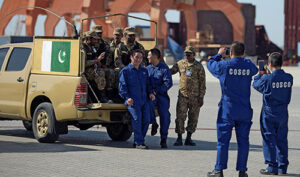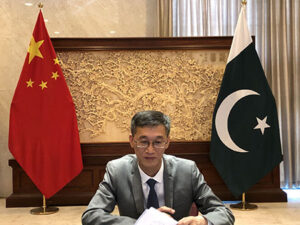Sino-Pak relations are often cited with envy by many. Among ourselves, we call it the “iron brotherhood” — an expression exclusively reserved in China for Pakistan. No surprises therefore that the China-Pakistan Economic Corridor (CPEC) became the flagship of President Xi Jinping’s Belt and Road Initiative (BRI). It raised hopes and expectations, but simultaneously, brought with it unprecedented pressures like never before. It required turning MoUs (Memorandums of Understanding) into actions on the ground i.e. swift implementation, if it were to be a game-changer. Gradually, it became a mismatch between Chinese expectations and Pakistani’s tardy, multi-layered “planning commission” regime. Chinese officials, in fact, had to take things in their own hands — the CPEC framework and the Long Term Plan — after Pakistani politicians and bureaucracy moved at a snail’s pace. “We had to take the entire planning into our hands after we saw issues of inability and the lack of will impeding translation of CPEC into action,” a senior Chinese official told me a while ago.
The problem: Pakistani politicians and the bureaucracy were as usual, tom-tomming to the world that the CPEC was a game-changer, without any concept of the demands that an undertaking on this scale placed on Pakistan. The change of government in mid-2018 and Prime Minister Imran Khan’s focus on social sector development, coupled with the COVID-19 outbreak, further complicated issues. And another major obstruction has been those strong lobbies within the governance structures, which are intrinsically — or out of financial/economic interests — inclined against China. No wonder then that even the projects of an urgent nature, such as the 300 MW Gwadar Power Plant, were put under scrutiny through routine testing and approval procedures.

The consequence: the state of relations between the two countries was not good; in fact, it has been beset by relative unease these days.
The unease had led to a slowdown in the implementation of several projects —COVID-19, of course, was one contributor, but the problem began with pressure on Chinese power companies to cut the tariffs for CPEC power projects — Port Qasim, Sahiwal and Hubco — which have been run at a mutually agreed rate of 8 cents per unit since 2016.
In order to deal with the spiralling circular debt, government officials had been renegotiating tariffs with local companies. However, that was possible only because these plants had already recovered their capital cost and had been receiving undue favours even after over 10 years of operations.
Officials of the power ministry attempted to do the same, asking all Chinese companies to reduce tariffs. They gave even President Arif Alvi this issue as one of the talking points for his meeting with President Xi Jinping during his March 2020 visit to Beijing, saying our economy was not in good shape and that the power tariffs were too high.
This approach reportedly displeased most of the Chinese leadership because they were already operating at costs much lower than what the old power plants had been charging for nearly two decades.
The government’s attempts to force Chinese companies to revise tariffs also delayed the Gwadar Power Plant; the Chinese company refused to begin construction unless the government honoured the agreement signed in November 2019, which was 7.5 cents per unit.
How can you force the investors to review contracts that were signed only a few years back? Which foreign investor will come if the state does not stick to its contractual obligations, asked a Chinese business executive, who, like many others, looks at the issue as a matter of trust and credibility of the host government.
The CEO of the company, who was supposed to steer the Gwadar Power Plant, was called back to China and told to wait. He may be returning now that the government has finally dropped its demand.
Former Chinese ambassador, Yao Jing, tried his best to accelerate the pace of CPEC-related approvals and execution in Pakistan but failed and, hence, did not get his promotion within the foreign ministry that ambassadors usually get after serving at important postings such as Pakistan. Probably his bosses in Beijing concluded that Yao Jing failed to comprehend how Pakistan works, remarked a Chinese friend.

It is extremely unfortunate that because of this no CPEC ministerial meeting has taken place since November 2019. COVID-19 was one problem but the bigger one was the government’s insistence on revision of contracts.
Several examples underline the pathetic routine response by Pakistan’s decision-makers; Rashakai Economic Zone, for instance, may be delayed by nearly two years — something totally out of step with the Chinese model of speedy and relentless action once the decision has been taken. The PML-N government had left issues such as land acquisition and provision of utilities for Rashakai to the respective departments. Consequently, a project that needed to be handed over to the Chinese investors, with all the requisite facilities, remained stuck for over two years.
The issue of the legal framework for the Gwadar Port and the Industrial Zone was fully resolved only recently, over five years after CPEC was born.
Another source of disappointment is the snail-paced movement on the railways ML-1 project; there has been no settlement as yet between both sides on the terms of financing, namely the government-to-government loan — the amount, interest rates, and the repayment period.
Equally upsetting for the Chinese counterparts has been the recent uproar over the fencing issue in Gwadar. How can security officials hope to enhance social support for CPEC endeavours if they don’t take the locals into confidence, wondered many.
Imagine the cost of the lost time and lost opportunity! A project that should have begun in November 2019, is going into its implementation stage after a delay of nearly 18 months.
Pakistan’s loss of credibility and erosion of its goodwill is even greater. You don’t do this to a country that has stood by Pakistan through thick and thin, the only country that has invested nearly 30 billion dollars in less than six years.
A direct consequence of this arm-twisting by Pakistani officials is that the Sinosure insurance company has stopped providing insurance to the Chinese private business in Pakistan since the new government began demanding revision of contracts signed during the Nawaz Sharif government. No bridging loans anymore because of the uncertainty created by the PTI government’s demands.
The China Export Credit & Insurance Corporation (Sinosure) is a state-funded insurance company. Until the end of 2017, the cumulative domestic and foreign trade and investment supported by Sinosure exceeded $3.3 trillion.
The high-handed approach towards Chinese power companies obviously disregards the benevolence that Beijing displayed over and above the CPEC framework, which brought several billion dollars’ worth of investment into Pakistan within a few years.
At a time when Pakistan is submitting to extremely tough conditions for the resumption of the IMF loan, which will entail pushing the price impact onto the masses, China has already increased the size of the bilateral currency swap to $4.5 billion, that was used to return the $3 billion Saudi loan. China has also rolled over $2.5 billion commercial loans in this fiscal year and additionally, plans to extend $4.4 billion in the next fiscal year. It remains a life-line to support Pakistan’s balance of payment position.
Our leadership has for far too long used Pakistan’s location as a bargaining chip in its deals with the US and China. But, frankly speaking, over the years this location has become like a noose around our neck and throttled any prospective thinking focused on national interests. This has clearly prevented them from taking approaches that are imperative if they want the country to progress and retain China’s invaluable support. Geo-strategic location is not exactly a blank cheque for unqualified external support. The recent China-Iran strategic cooperation deal is perhaps a warning that Beijing is not likely to rely on a nuclear-armed Goliath, which is hamstrung by the burden of its own inaction, tardy governance system, policy contradictions, and a partially delusional romance with its super geo-strategic location, which is turning out to be more of a liability than an asset.

The writer is the founder and Executive Director of the Centre for Research and Security Studies.



